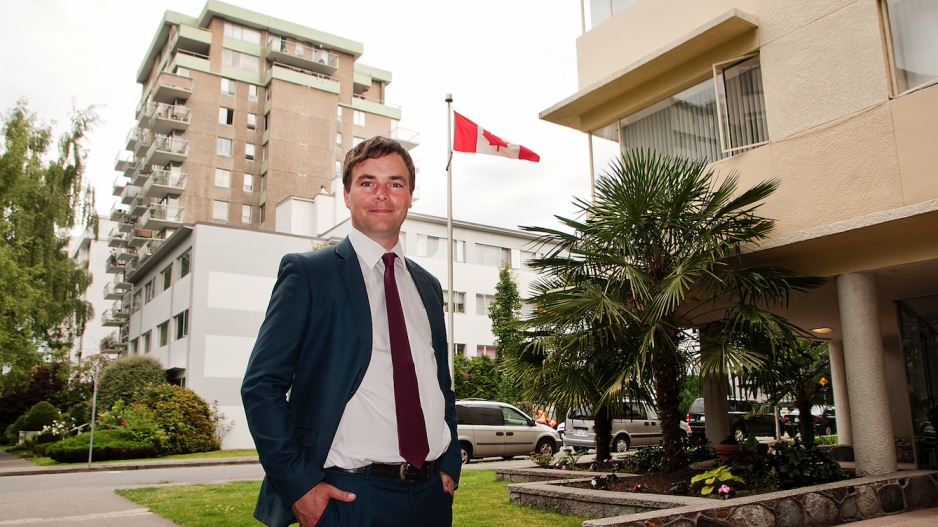As renters compete for sparse and expensive housing, landlords are increasingly using a type of tenancy agreement that allows them to circumvent British Columbia’s 2.9% annual rental increase limit.
Under a fixed-term rental agreement, the renter and the landlord sign a clause agreeing that the rental term will be for a certain time period, usually one year. At the end of the period, the renter agrees to vacate the unit. If the renter wants to stay, he or she must negotiate a whole new lease – which can include a big spike in rent.
“Landlords can get around the cap by getting new tenants in and raising rent,” said Andrew Sakamoto, executive director of the Tenants Resource Advisory Centre (TRAC). “That’s why rent has escalated so much in recent years.”
The City of Vancouver has been offering incentives to developers to build new rental properties, but does not prohibit fixed-term tenancies in those buildings: city staff said that would require action from the provincial Residential Tenancy Branch.
Spencer Chandra Herbert, NDP MLA for Vancouver-West End, said complaints to his office have picked up over the past two years; the rent increases being asked for range from 10% to 30%.
That’s far above the 2%-plus-inflation annual increase allowed by provincial legislation for renters who are on month-to-month agreements.
Business in Vancouver corresponded with several tenants facing big increases who were reluctant to speak about the issue publicly because they still occupy their unit or are in the process of moving out. In one case, a tenant’s rent for a two-bedroom apartment went up by $350 a month.
While renters must initial a clearly worded statement saying they will vacate the unit at the end of the term, intense competition for scarce apartments means that many are signing with the hope that the landlord will act in good faith. Others don’t understand what they have signed until they get a letter from their landlord stating a significant increase, said Herbert and Sakamoto. But there is little recourse for renters after they have signed the agreement.

An example of a fixed term tenancy form; tenants who agree to accept clause D are left with little recourse to challenge rent increases at the end of the term
A group representing B.C. landlords said fixed term agreements are not “broadly used” by owners of residential rental properties.
“Both parties know the contract ends at a fixed date and the tenant ends their tenancy,” David Hutniak, CEO of Landlords BC, wrote in an email. “The new contract will typically be at market [rent], which is understandable. The 2% plus CPI restriction does not apply in this scenario.”
TRAC has been following the issue for several years and has discussed the problems caused by fixed-term leases with the province’s Residential Tenancy Branch; the group would like to challenge the rules in court, arguing that a tenancy does not actually end if a tenant continues to live in the same place. Herbert has asked Rich Coleman, B.C.’s minister responsible for housing, to change the legislation. And a task force on affordable housing struck by the City of Vancouver has recommended that the province take steps to make sure fixed-term tenancies are not being used to get around the rent-increase cap.
The Residential Tenancy Branch is “working with stakeholders” on the issue of back-to-back fixed-term leases, communications staff at Coleman’s ministry wrote in an email. That work has just started and will take some time.
Fixed-term contracts are one factor that could be driving the sharp rise of rents in Vancouver. Tom Davidoff, an economics professor at the University of British Columbia, was surprised to discover an abnormally high increase in rental rates when he collected Vancouver rental listings information from Craigslist throughout April and May.
“A glance at rents suggest they’re rising quite quickly, and that’s consistent with what I hear from industry people,” Davidoff said.
The results are only a snapshot from one rental listings source, Davidoff cautioned, and more data would need to be collected over a longer period of time to verify the trend.
Between 2015 and 2016, rents in Vancouver’s downtown and West End rose 7.1%, according to Canada Mortgage and Housing Corporation’s fall 2016 survey, while Vancouver’s vacancy rate fell to 0.6%.
As it has in many large Canadian cities, Vancouver’s supply of purpose-built rental buildings has been stagnant for several decades. This year’s sharp increase in property assessments, a result of the steep lift in residential real estate values over the course of 2015, has resulted in much bigger property tax bills for some rental-building owners.
Given the pressures being placed on rental supply in Vancouver, the sharp increase in rates doesn’t surprise Andy Yan, an urban planner and acting director of the city program at Simon Fraser University.
Airbnb and other short-term rental sites are another important factor, Yan said. On June 7, the site InsideAirbnb.com showed 3,179 listings for entire houses or apartments and 1,399 private rooms.
“You’ve got rents going up because supply went down: when supply got cut by Airbnb, by units not being built, and the units that were built were very high-end,” Yan said.
The City of Vancouver is currently studying how to address Airbnb and other short term rental sites.
- With files from Frank O’Brien
Have you had an experience with fixed-term tenancy? If you'd like to share your story, please contact Jen St. Denis at [email protected]




